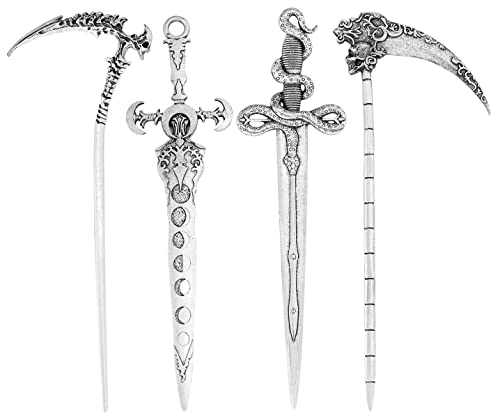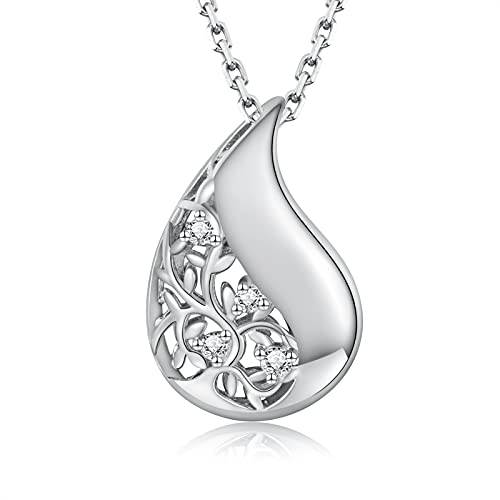Celtic-World.net
Celtic Culture and Music

The Celts were a group of Indo-European peoples who, in their heyday (4th-3rd century BC), were settled in a large area of Europe, from the British Isles to the Danube basin, as well as some isolated settlements further south, the result of expansion towards the Iberian, Italic and Anatolian peninsulas.
United by their ethnic and cultural origins, by the sharing of the same Indo-European linguistic background and by the same religious vision, they remained always politically fractioned; among the various groups of Celtic populations there are the Britons, the Gauls, the Pannons, the Celtiberians and the Galatians, settled respectively in the British Isles, the Gauls, Pannonia, Iberia and Anatolia.
Bestselling Products
ASHINE Sterling Silver Necklace for Women (1mm Box Chain Lobster Clasp 18 Inches)
- [Material & Size] Nickel Free 925 Sterling Silver. Stamped 925 and ITALY. Sturdy 1mm box chain. The size of the loop at the end of our chains is 6mm in diameter, perfect for a pendant.
- [Two Diameters Available] The 0.8 and 1 mm diameters can be matched to create different styles. This sterling silver necklace has a good reflective effect, resists oxidation, makes it shiny and prevents tarnishing.
- [Perfect Gifts] Sterling silver chain comes with gift cards and polishing cloth, it can be worn alone or perfectly fit for any charm like pendant, couple rings, etc. Also can be a cute gift for valentine, friends, relatives and so on.
- [Care and Maintenance] The way to take care of silver chain is to remove it any time you use harsh chemicals like cleaning agents, lotions, hairspray, powders. Use A soft toothbrush and warm water to remove any residue, and a soft cloth will gently clean and polish.
- [Service] We will provide every customer with comprehensive after-sales service. If you have any concerns about this item, please feel free to contact us and we will help you as soon as possible. If Ours Break for Any Reason We Will Replace It Free.
NASHALYLY Women's Chiffon Elastic High Waist Pleated A-Line Flared Maxi Skirts(White,L)
- ◆Elastic waistband:If your waist is very thin, women skirt can make you look thinner.If you need a bigger waistline, it also stretches waistline.
- ◆Double deck design and opaque long skirt: This skirt is a two-tier design, so it is not transparent and can be worn on any occasion.
- ◆High quality material:Chiffon (100% Polyester). A line style, double layers breathable and comfortable material.
- ◆You can wear long Chiffon skirt on many occasions: Party,Beach,Vacation,Date,Street,Formal,Cocktail,Wedding,Daily wear,various for Celebrations,Festivals.
- ◆Easy wash: Easy hand wash or machine washable in cold water; hang dry
Salt Shaker or Pepper Shaker with Adjustable Pour Holes - Stainless Steel Spice Dispenser - Perfect for Pink Himalayan, Table Salt, Black and White Pepper
- ✅ Easy yo use – A handy shaker with a perfect size of 4 inches tall and holds around 1/2 cup of spices. You fill it once via wide opening and it serves you, without the need to constantly refill.
- ✅ Adjustable & Keeps freshness – The removable rotating lid have 4 different modes: closed, open, big holes and small holes. With three different holes size, you can control the quantity of seasonings added to your meal according to your taste. The lid enables to maintain the freshness for a long time and to protect from dust & moisture.
- ✅ Premium quality & Modern design - The brushed stainless steel cover with high-quality glass body is a lovely addition to any kitchen. This long-lasting kitchen utensil will serve you in different environments such as - kitchen, dining table and also while camping.
- ✅ Choose your spice – Fill the shaker with your favorite spices like: Sea, Himalayan, Table or Kosher Salt, Black, White, Four-color Pepper, from fine to coarse seasoning. Sprinkle your favorite spices and enrich your food on any meal. *Spices not included
- ✅ Customer guarantee – Our shaker can be used by everyone from stay-at-home moms to professional chefs. However, if you're not completely satisfied, we'll give you a 100% refund within 90 days of purchase. Add a shaker to your shopping cart today! Don't forget to also buy this as a perfect gift for your family and friends.
Honsny 12PCS 14K Gold Plated Toe Rings for Women Adjustable Band Rings Open Flower CZ Toe Ring Set Beach Foot Jewelry
- [ADJUSTABLE TOE RINGS] You will get 12pcs toe rings of various types in one order, such as cz toe ring, flower toe ring, love knot toe ring, star toe ring, 3 row toe ring, simple band toe ring, dolphin tail toe ring and twisted toe ring. Our dainty adjustable toe rings are stylish both for women men girls. tail toe ring and twisted toe ring.Our dainty adjustable toe rings are stylish both for women men girls.
- [PREMIUM-QUALITY] Our silver gold toe rings are made of high-quality copper. 14K gold plated surface will last for a long time to wear, nickel-free, lead-free, hypoallergenic to your skin, pretty lightweight and comfortable to wear. Minimalist summer foot jewelry, never go out of style.
- [ADJUSTABLE SIZE] The toe ring set come in adjustable design suited for everyone, meet most toe sizes.It can be used as knuckle rings, stacking rings, midi rings, finger rings. Convenient open design, adjustable size, fit different toe fingers. Perfect summer jewelry, will make you more elegant in clouds.
- [IDEAL GIFT] Our adjustable toe rings are perfect for any occasion, casual to formal. They will make you charming and fashionable on beach party, dancing, wedding, poolside, summer cocktail party and other occasions. Special gifts for mother, daughter, girlfriends, lover, couple, girls and so on, or as a treat for yourself.
- [AFTER-SALE SERVICE] HONSNY Jewelry is aim to provide customers with the best jewelry and the best service. If you are not completely satisfied with our products, please feel free to contact us, we will reply it in 24 hours and try our best to solve all problems.
Men's Ankle Banded Pants Medieval Viking Navigator Pirate Costume Trousers Renaissance Gothic Pants, Black, Medium
- Cotton Blend, very soft and super comfy to wear.
- Draw-strings at the waist for easy fit. Button ankles insure no ride-up.
- Low crotch and very full leg for ease of movement.
- Pirate/peasant, renaissance costume pants,lace-up cuffs at calf.
- Lightweight, breathable acts and washes like cotton.
Jewlpire 18k Over Gold Chain Necklace for Women Girls, 1.1mm Cable Chain Gold Chain for Women Shiny & Sturdy Women's Chain Necklaces, 18 Inches
- Hypoallergenic & Comfortable: This gold chain is made with 925 sterling silver base and plated in 18K gold, which will both stay consistent and reflective. All the materials we used in this gold chain are Hypoallergenic, Lead-Free and Nickel-Free. A smooth and flowing surface, brings perfect comfortable wear feel for You.
- Super Shiny & Smooth: The gold necklace chain adopts excellent plating techniques, which makes it very shiny and feel smooth. Also, the gold chain necklace for women has a reflective effect, oxidation resistance, bright luster and doesn't fade or tarnish easily over time.
- Sturdy & More Durable: This gold chain is composed of multiple sturdy rings. It adopts compact links on the chain to ensure this chain is more sturdy and would not break easily. Italian imports upgraded Spring-ring clasp of gold chain necklace, easier to open and wear, and even the short nails are convenient to clasp.
- Great Gift for Her: Gold chain for women is suitable to wear alone or add a pendant, like diamond, cross, engagement and wedding rings or couple rings, etc. Packed in a pretty gift box, this womens gold chain is indeed a classic gift for your mom, daughter, wife, grandma, sister, girlfriend, best friend, or yourself on Christmas, Valentine's Day, Birthday, Mother's Day, wedding anniversary, graduation ceremony, etc.
- Jewlpire Trendy & Fashion Jewelry: Please search the brand "Jewlpire" on amazon for more designs! We are devoted to providing high-quality and fashion jewelry, to help people find confidence in Hello, elegant in life and express their fashion attitudes. Also, we love to see each customer wear our jewelry with a big smile.
PAVOI 14K Yellow Gold Plated Dainty Pear Pendant Necklace for Women | Tear Pendant Necklaces
- Ready to sparkle? Our 19" adjustable dainty teardrop necklace is the talk of the town, plated in 14k yellow gold. It's not just a piece of jewelry; it's your outfit's best friend, ready to make you shine with its delicate, teardrop pendant. Plus, with a comfy slider chain and a trusty lobster clasp, it's as functional as it is fabulous and trendy!
- Say hello to your new fave jewelry addition. This little beauty not only looks fab but is kind to your skin too, making it the perfect go-to for adding a bit of sparkle to your everyday. Our 14k yellow gold-plated necklace promises a long-lasting finish that lasts. It's 100% nickel-free, cadmium-free, lead-free, and hypoallergenic – because we're all about keeping you stylish and comfortable!
- ✦ 60-DAY GUARANTEE ✦ Your happiness is our number one priority. To ensure your complete satisfaction, we offer a hassle-free 60-Day money-back guarantee. To get in touch, email or chat with us - a member of our team will be happy to help you.
- ✦ SUSTAINABILITY ✦ PAVOI is dedicated to sustainability throughout our entire product cycle. Our jewelry is made from 100% recycled materials and we package in 99% recycled materials. We work to reduce our carbon emissions and offset plastic consumption by removing 275,000 bottles from oceans annually. We are committed to maintain a balanced and eco-friendly business that minimizes our environmental impact. Trust that PAVOI is continuously working towards a greener future.
- ✦ PROUDLY AMERICAN-OWNED ✦
Amazon Basics Four-Tier Jewelry Tree Stand - Walnut/Black
- Jewelry stand with 4 tiers for hanging earrings, necklaces, bracelets, and more
- Space-saving tree design allows you to keep your favorite accessories at your fingertips
- Layers positioned at different heights for hanging a variety of jewelry styles and lengths
- Front bars feature perforations for easy earring storage
- Beechwood base dish for storing rings and other small items and accessories
EYNMIN Women's Satin Lace Strap Mini Dress Square Neck Flowy A-Line Ruffle Swing Casual Short Dresses White L
- Fabric: Flowy ruffle mini dress made of 92% Polyester, 8% Elastane. Soft, skin-friendly, smooth, with lining not see through.
- Features: This casual swing short dress, lace strap, square neck, ruched bust, high waist, a-line, ruffle hem, backless, lace up back, zipper back, accentuates your hourglass figure perfectly and hides your body imperfections for a slim and sexy look.
- Occasion: The a line swing short dress suitable for vacation, casual, graduation, going out, night out, holiday, birthday, wedding guest, date night, homecoming, club, party.
- Size Guide: XS = US 0-2; S = US 2-4; M = US 4-6; L = US 8-10; XL = US 10-12; XXL = US 12-14. Please refer to our size chart, any questions please feel free to contact us.
- Washing Care: EYNMIN casual dress hand and wash in 30 degree water, hang to dry in the shade, no bleaching.
NHL Boston Bruins '47 Clean Up Adjustable Hat, Black, One Size
- Adjustable strap closure - one size fits all
- Relaxed Fit
- Garment washed for softer look & feel
- High quality raised embroidered team logo on front
- Check out all new '47 caps, knits, t-shirts, hoodies, pullovers, socks, scarves and more -- available for all your favorite teams!
- Made from 100% cotton twill
Bearers of an original and articulated culture, they were subject from the 2nd century B.C. to growing political, military and cultural pressure from two other Indo-European groups: the Germans, from the north, and the Romans, from the south. They were progressively subjugated and assimilated, so much so that already in late antiquity the use of their languages appeared to be in clear decline and their retreat as an autonomous people is testified by the marginalization of their language, soon confined only to the British Isles. There, in fact, after the great reshuffling of the early Middle Ages, the historical heirs of the Celts emerged: the populations of Ireland and of the western and northern fringes of Great Britain, speaking Brittonic or Goidelic languages, the two varieties of Celtic island languages.
















